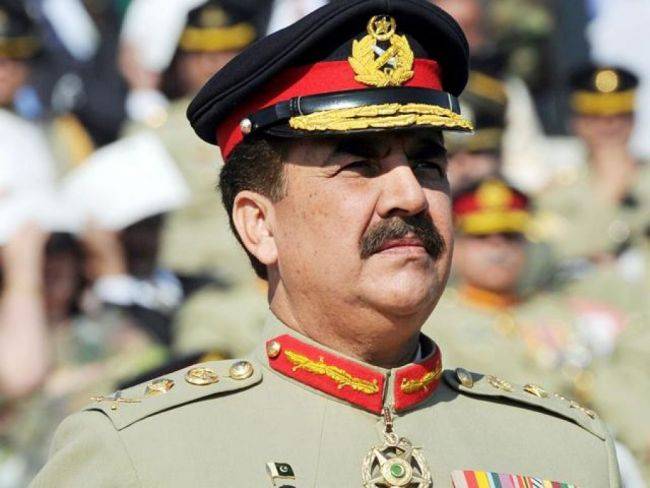In his latest move from distant shores, Asif Zardari decided to go gaga over General Raheel. Not long ago, just before running away from Pakistan in June last year, the PPP Big Boss had decided to hurl threats at the army chief, warning him that his power extended only till the end of his tenure while the power of politicians like him lasts forever; passing from one generation to the next a dark beacon of hopelessness for the people, he might as well have added.
It is amusing that Zardari would now like the government to extend General Raheel’s tenure as COAS. While there are many ways to read this development, and we can trust our media analysts to explore its every remote angle, one thing is clear. Regardless of the merits and demerits of an extension for the army chief, you can’t take Zardari’s somersault on face value. Though couched in nationalistic rhetoric, the statement is meant to weaken the man it pretends to tribute.
Let’s not mistake it: Zardari’s latest trick is obviously driven by his utmost desire to make his personal power last forever, just like everything else he has done in his political life. After all, for five long years, he accomplished the feat of running our parliamentary system from the Presidency like a mafia don, Big Boss and Big Brother rolled into one. After all, we’ve seen him in action.
For those of you who might have missed his selfish shenanigans as President, it might prove instructive to take a closer look at the PPP government in Sindh which he remote controls from distant shores these days. The abuse of political power for personal ends is not exclusive to Sindh, of course. But it is clearly more rampant and its consequences more naked and ugly as elsewhere in the country. What could be more ugly and naked as children dying of malnutrition in Thar, year after year, and the government refusing to help them, blaming the victims instead?
Some friends in the media would rather not distinguish between brute dark power and benign power. They don’t think it is important that one is used for blatant exploitation of people in order to perpetuate and maximise personal privilege and the other is exercised for collective good. They don’t think it matters that dark power considers itself above the law while benign power is exercised judiciously. Merrily, our opinion leaders arrive at grim but politically-correct conclusions about our destiny.
They’d much rather indulge in value-neutral commentaries and speculate about superficial causes and effects of political events as they unfold. Constitutionality is a stick to exclusively browbeat the security establishment. As far as the political leaders are concerned, everything goes. They’d like to free the so-called leaders of all morality and evaluate them in the heartless mindless language of what they call realpolitik. Surely there is more to leadership than that.
What about the people in whose name these so-called leaders govern? Shouldn’t the impact on public welfare be the most important measure of their leadership? Isn’t it the stated reason for which they exist? Why, after all, are all these power players who’d like to last forever forced to utter so many words about people and their welfare, words they obviously don’t mean? Is leadership another name for shrewd moves aimed at gaining and perpetuating political power? It is time to make the important distinction between leaders and power-players.
There is no dearth in our world of power-players like Zardari who have made politics into a career for self-advancement rather than the noble endeavour to serve the people that it is meant to be. In fact, the corridors of global power are lorded over these days by such so-called leaders whose single-minded pursuit of petty and personal ambition has made our beautiful world a grim place for humanity. This self-serving style of leadership has turned the murky soup of parliamentary democracy in our country into a cruel joke. Can you point out one party leader in there who could see beyond his nose?
Against this sordid background, this vacuum of leadership, General Raheel shines like a full moon. He has clearly risen above the self to serve his country with sincerity. Though embraced as a national hero across the country, he has not let it go to his head. His decision not to accept an extension of his tenure might have come as a disappointment to those who’d like him to be crowned as our next messiah, but it proves the fact that he is an honest man trying to do his duty to the best of his ability.
Who could deny all the life-saving good things General Raheel has done for Pakistan as the Chief of the Army Staff. What makes him a great leader is his lack of interest in employing the immense public goodwill he has gained to perpetuate his personal power. This makes him an outsider in the smelly corridors of state power, an outsider who could upset the rotten applecart any time. Hence the need of political power-players to tame him; through the value-neutral campaign in the media to bolster the populist credentials of our political elite on the one hand and through devious tributes like the one that Asif Zardari has come up with now.
The campaign gives legitimacy to dark power as a valid goal of politics, brushing all power in hues of gray. Similarly, keeping the talk about an extension alive serves the purpose of blunting the brilliance of benign power. By trapping General Raheel in the same compromising game of self-advancement that our so-called leaders play, Asif Zardari would like to take away from him his moral authority and his teeth for the rest of his tenure, whether it is extended or not.
Obviously, General Raheel’s wings are the ones that bother our unaccountable and above-the-law political elite the most. These are the wings that our so-called leaders are all very eager to clip, one way or another.






